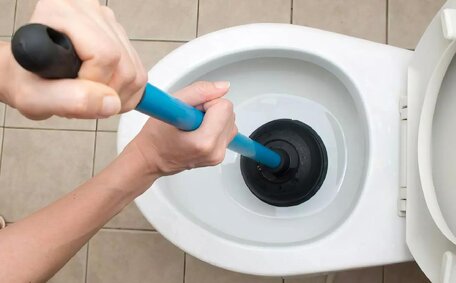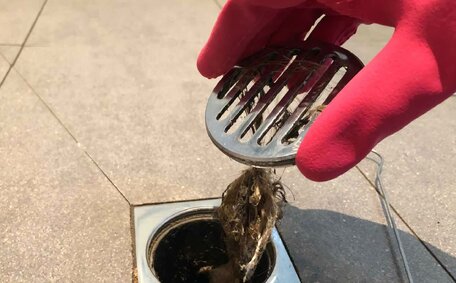
How to Prevent Household Blocked Drains
Blocked drains can be prevented by using drain strainers, avoiding pouring oils down drains, clearing hair from drains, and more tips from Seven Hills Plumbing.
Read MoreBlocked drains are frequently due to improper disposal of materials such as 'flushable’ wipes down toilets. You might think wet wipes are harmless, but they are common culprits when carelessly flushed down toilet, alongside cooking oils and grease washed down sinks, hair and soap residue in sink shower bathtub areas, and avoiding the accumulation of food scraps and waste in sink strainers.
The accumulation of these substances, entering your pipes can cause blockages that limit water flow and result in clogs. Tree roots invading your drain pipes can easily lead to blocked drains. Neglecting regular drain cleaning can escalate small issues into severe obstructions and eventually full blockages.
Many common blockages originate from non-flushable items, including excess toilet paper, which is a significant contributor to sink and toilet clogs. Adopting proper disposal habits is essential to keeping your kitchen sink and toilet free from preventable blockages.
Disposing of oil down your kitchen sink commonly causes blockages in the drainage system. Grease can solidify inside the pipes of both sinks and showers, adhering to their walls and impeding water flow.
To understand how to prevent blocked drains, start by using sink strainers and responsibly disposing of cooking fats without pouring them down the pipes. After using cooking oil, let it cool and solidify before disposal to avoid it entering your kitchen drains. Scrape hardened cooking grease directly into the bin to prevent blockages in your drains.
Wipe down oily pans and dishes with paper towels which can absorb excess oils before washing – a simple act can help you avoid your blocked drain scenarios; similarly, collecting hair and soap residue helps to prevent blockages in shower drains.
Improper disposal of grease can damage pipes, resulting in leaks, backups, and expensive overflows. If a grease clog leads to sewer line blockages or indoor flooding, repairs may cost thousands of dollars. Properly disposing of fats oils is crucial to keep your drains unobstructed.
Installing strainers can prevent debris from entering your plumbing system and clogging kitchen and bathroom pipes. Strainers are effective against clogs, capturing items like hair and food scraps, thus keeping them out of your drainage system.
Strainers keep hair, soap scum, and other solids out of your bathroom drains, ensuring a free-flowing drainage system. Regular cleaning of strainers is critical to prevent debris clogs, with accumulated waste disposed of in the bin. Ensuring the removal of debris beyond the strainer is crucial to avoid future pipe blockages.
Clogged strainers cannot efficiently filter debris.
Sink and tub strainers are essential for stopping hair and soap residue from clogging your bathroom drains. Use sink strainers to efficiently trap food scraps and particles in the kitchen. Identifying habits or items in your home that contribute to blocked drains is essential; a key step is installing and maintaining strainers.
Using a mixture of baking soda and vinegar through your drain strainer offers eco-friendly and effective drain cleaning. a blend of baking soda and vinegar can effectively break down grime, grease, and hair in pipes.
The reaction between baking soda and vinegar creates effervescent bubbles that lift grime from pipe interiors. The reaction also generates heat to melt and dislodge accumulated fats and oils. Let the mixture foam and work its way down line for 5-10 minutes before rinsing with hot water.
For more effective drain unblocking and extra cleaning power, cover the drain after adding baking soda and vinegar. The pressure buildup intensifies the scrubbing effect. Placing a wet cloth over the drain creates a tighter seal.
Regularly employing this natural drain cleaner method weekly is a superb tactic to avert a clogged drain and maintain odour-free drains. Baking soda neutralises odours while vinegar disinfects. Avoid using this method after chemical drain cleaners, as dangerous reactions may occur.
By adopting daily habits, households can keep drains clear and maintain free-flowing pipes:
Making minor changes to your daily routines can prevent the accumulation of hair, grease, and solids in your drain. Hot water flushing helps debris once they can get moved through before it sticks, while strainers catch food particles. Consistent drain maintenance habits keep your plumbing system obstruction-free.
It’s important to realise that minor blockages in your home can often be cleared with household solutions such as baking soda, vinegar, boiling water, plungers, and drain snakes. However, should DIY methods fail to clear clogs, it’s advisable to call a professional plumber.
Severe obstructions often necessitate calling your plumber, as they require commercial-grade equipment beyond what’s available to homeowners. Blockages deep in your main sewer line are difficult or impossible to mechanically clear without professional gear.
A blocked main sewer may also indicate conditions where prevention would have been better than repairs, pipe collapse, tree root invasion, or other complex problems needing assessment and repair. Professionals, such as those serving the Central Coast, utilise video inspection tools to assess damage and devise solutions for blocked drains in your home’s plumbing network.
Signs it’s time to call a pro include:
Seven Hills Plumbing has powerful commercial hydro jetting to scour stubborn obstructions even in main sewer lines. Contact us on 1300 349 338 or [email protected] for blocked drain assistance.
Several warning signs indicate a drain inspection by a professional Seven Hills plumber is necessary to identify and resolve blockages or other underlying issues:
Should you experience any of these issues, contact Seven Hills Plumbing for a comprehensive drain inspection. Using state-of-the-art video cameras and locators, our technicians will assess the location, extent, and cause of blockages to determine the best repair method.
Catching minor issues in your home drains around your home can prevent costly damage from leaks and overflows. Our team has the equipment and expertise to inspect main sewer lines and all branch drain lines including stormwater drains throughout the home. Contact us online or call 1300 349 338 to schedule drain inspection services.
Blocked drains can be prevented by using drain strainers, avoiding pouring oils down drains, clearing hair from drains, and more tips from Seven Hills Plumbing.
Read MoreNoticing signs of a household blocked drain like slow drainage, gurgling sounds, foul odours or overflowing water indicates you need an emergency plumber. Call Seven Hills Plumbing to dispatch a plumber to clear your blocked pipes before further damage.
Read MoreRestaurants and cafes frequently deal with blocked kitchen drains due to grease, fat and food buildup. Prevent clogged pipes through scraping plates, using drain strainers and avoiding pouring fats/oils down sinks. Or call a professional plumber to hydro jet pipes and permanently clear blockages.
Read MoreSeven Hills, 2147 NSW
We will call back as soon as possible.




